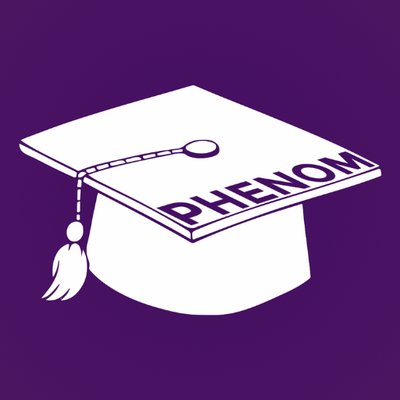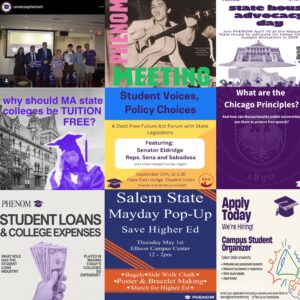Friend,
Welcome back to The PHENOM Update, our official monthly newsletter where we keep you updated on recent goings on in our campaigns and around the higher ed world!
PHENOM announces free speech campaign on MA public college campuses
Amid the federal government’s unprecedented attacks on colleges’ right to free speech, PHENOM is excited to announce our campaign to strengthen free speech on all Massachusetts public campuses through the Chicago Principles!
By persuading all of Massachusetts’ public university administrations and boards of trustees to endorse this pro-free speech document, we can lay the foundation for a revitalized culture of free expression so essential to our colleges’ mission of education.
But what are the Chicago Principles? Also known as the Chicago Statement, the Chicago Principles are a document the University of Chicago published in 2014 to set in stone the University’s commitment to free speech as long as it did not result in violence, defamation, privacy violations or unreasonable “time, place and manner”.
The statement cites the longstanding wisdom that it is much better to defeat bad ideas through open discussion than through censorship. This is especially the case for a university, whose entire purpose is to make people question preconceived notions and challenge the status quo through open debate.
The Principles powerfully cite UChicago’s former president President Hanna Holborn Gray, who said that “education should not be intended to make people comfortable, it is meant to make them think”.
According to the Foundation for Individual Rights and Expression (FIRE), over 100 universities have signed onto the Chicago Principles, including Princeton University, Purdue University, American University and Columbia University. Massachusetts public universities are next!
RSVP for PHENOM’s annual meeting on July 9th!
Save the date! PHENOM is hosting our annual meeting on July 9th at Salem State University and via Zoom, from 11 AM to 1 PM (room TBD shortly), where we will discuss next year’s priorities and budget, hold elections, as well as host an interactive workshop! Refreshments will be provided.
All Massachusetts students, union members, faculty, and anyone passionate about improving public higher education are welcome. RSVP and stay posted for further details!
Rue: “Endowment taxes are a good idea, the Republicans’ version is terrible.”
In an article published this June by HorizonMass, PHENOM’s Communications Chair Liam Rue makes the case for why Trump and Republicans’ proposed endowment tax should be opposed at all costs.
Republicans’ endowment tax, as part of the larger “Big Beautiful Bill”, has about two redeemable qualities: at the very least, it is an endowment tax; and second, it taxes colleges based on spending per student rather than wealth regardless of size (this way, colleges are rewarded for educating more students).
However, as Rue argues, its negatives far outweigh the positives. This is especially because a much better endowment tax is possible; namely, the Massachusetts endowment tax PHENOM has supported for years.
Simply put, why settle for Republicans’ deeply flawed version that 1) levies cripplingly high taxes on colleges (yes, even for us!); 2) has no plan for spending the revenue; and 3) is yet another thinly veiled effort to punish universities that refuse to kowtow to the Trump administration.
Stay in the loop and follow us on Instagram!
As we work to rally students and faculty across the state to fight for a more affordable, fairer higher education system, social media is the go-to way to keep our allies and communities up to date. Check out our official statewide Instagram page @massphenom, as well as our chapter pages @umassaphenom and @dartmouth_phenom!
In Other News:
Republicans’ Pell grant cuts could end Commonwealth’s free community college
Tucked away in Republicans’ gargantuan, highly controversial “One Big Beautiful Bill” is a proposal that could end Massachusetts’ highly successful free community college program known as MassEducate.
The Republican bill that Trump has championed proposes a wide-ranging number of reforms for how students pay for college. One of the most alarming is the proposal to end Pell grant eligibility for part-time students.
This would prevent countless Bay Staters from continuing their studies in all colleges, not just community colleges, as a substantial number of students need to study part time due to their jobs or family obligations. As such, this Republican proposal would end up hurting those of us who stand to benefit the most from a college degree.
But how do new rules for Pell grants threaten free community college? Restrictions on part time students’ eligibility would cripple free community college because Massachusetts actually relies on Pell grants to make free community college a reality: how it works is the state pools together all federal Pell grant funds allocated to the state along with additional state funding in order to make community college free.
The next question becomes whether this could threaten free community college for all students; or, whether free community college could remain, but only for students who are full-time. Again, what makes this proposal so ironic is that students who cannot afford to be full-time are the ones who need free community college the most.
Another danger of this proposal is it would, in fact, also threaten to end tuition-free UMass that the UMass president Marty Meehan only announced last Fall (and which UMass promised to begin this Fall). This is because the UMass system had pledged to make all UMass campuses tuition-free, but only for Pell-eligible students. Since Republicans are suddenly poised to take away eligibility from thousands of Pell-eligible students just for being part-time, whether UMass will still be free for Pell students come September is now a major question mark.
How will Trump’s tariff policies impact college students?
Even if Trump does not cut Pell Grants and other direct funding programs for students, tariffs on crucial supplies such as laptops create problems of their own.
Food insecurity is already a huge threat to millions of students across the nation. Losing financial aid while the prices of goods continue to rise means students might have to choose between dropping out of school entirely, or trying to subsist on meager financial aid and insufficient food.
Transportation is also a huge barrier for students: twelve percent of students already report missing class or work due to transportation issues. Higher costs for automobile parts, building materials for houses, and a shortage of workers in the construction industry all contribute to a less friendly environment for students.
Rapid rehousing efforts in California show promising results
Back in 2020, California started providing critical support to students struggling with homelessness at public universities. Since then, the program has seen massive success. Participating students have been more likely to graduate, and a majority found stable housing just a year later – many in less than six months.
Students also reported higher extracurricular involvement, which is crucial to developing a strong, multifaceted network and fulfilling lifelong relationships. Student mental health also improved, as students felt less lonely and more resilient after exiting the program.
When a college education involves so much more than just textbooks and tuition, the promising results of California’s program shows how just a little support for additional costs like housing go a long way towards helping students reach their full potential.
More headlines:
U.S. House-passed tax bill weakens accountability at for-profit colleges, advocates say
In the battle between Trump and Harvard, trade schools may be an unlikely winner

